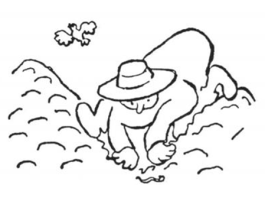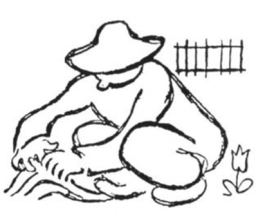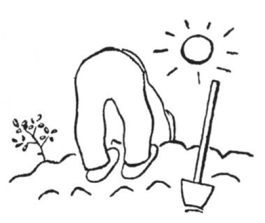When I was only a remote and distracted onlooker of the accomplished work of gardens, I considered gardeners to be beings of a peculiarly poetic and gentle mind, who cultivate perfumes of flowers listening to the birds singing. Now, when I look at the affair more closely, I find that a real gardener is not a man who cultivates flowers; he is a man who cultivates the soil.
 He is a creature who digs himself into the earth, and leaves the sight of what is on it to us gaping good-for-nothings. He lives buried in the ground. He builds his monument in a heap of compost. If he came into the Garden of Eden he would sniff excitedly and say: “Good Lord, what humus!” I think that he would forget to eat the fruit of the tree of knowledge of good and evil; he would rather look round to see how he could manage to take away from the Lord some barrow-loads of the paradisaic soil. Or he would discover that the tree of knowledge of good and evil has not round it a nice dishlike bed, and he would begin to mess about with the soil, innocent of what is hanging over his head. “Where are you, Adam?” the Lord would say. “In a moment,” the gardener would shout over his shoulder; “I am busy now.” And he would go on making his little bed.
He is a creature who digs himself into the earth, and leaves the sight of what is on it to us gaping good-for-nothings. He lives buried in the ground. He builds his monument in a heap of compost. If he came into the Garden of Eden he would sniff excitedly and say: “Good Lord, what humus!” I think that he would forget to eat the fruit of the tree of knowledge of good and evil; he would rather look round to see how he could manage to take away from the Lord some barrow-loads of the paradisaic soil. Or he would discover that the tree of knowledge of good and evil has not round it a nice dishlike bed, and he would begin to mess about with the soil, innocent of what is hanging over his head. “Where are you, Adam?” the Lord would say. “In a moment,” the gardener would shout over his shoulder; “I am busy now.” And he would go on making his little bed.
If gardeners had been developing from the beginning of the world by natural selection they would have evolved most probably into some kind of invertebrate. After all, for what purpose has a gardener a back? Apparently only so that he can straighten it at times, and say: “My back does ache!” As for legs, they may be folded in different ways; one may sit on the heels, kneel on the knees, bring the legs somehow underneath, or finally put them round one’s neck; fingers are good pegs for poking holes, palms break clods or divide the mould, while the head serves for holding a pipe; only the back remains an inflexible thing which the gardener tries in vain to bend. The gardener usually ends above in his seat; legs and arms are straddled, the head somewhere between the knees, like a grazing mare. He is not a man who would like “to add at least a cubit to his stature;” on the contrary, he folds his stature into half, he squats and shortens himself by all possible means; as you find him he is seldom over one metre high.

Tilling the soil consists, on the one hand, in various diggings, hoeings, turnings, buryings, loosenings, pattings, and smoothings, and on the other in ingredients. No pudding could be more complicated than the preparation of a garden soil; as far as I have found out, dung, manure, guano, leafmould, sods, humus, sand, straw, lime, baby’s powder, saltpetre, horn, phosphates, droppings, cow dung, ashes, peat, compost, water, beer, knocked-out pipes, burnt matches, dead cats, and many other substances are added. All this is continually mixed, stirred in, and flavoured; as I said, the gardener is not a man who smells a rose, but who is persecuted by the idea that “the soil would like some lime,” or that it is heavy (as lead the gardener says), and “would like some sand.” Gardening becomes a scientific affair. A rose in flower is, so to speak, only for dilettanti; the gardener’s pleasure is deeper rooted, right in the womb of the soil. After his death the gardener does not become a butterfly, intoxicated by the perfumes of flowers, but a garden worm tasting all the dark, nitrogenous, and spicy delights of the soil.

Now in spring gardeners are irresistibly drawn to their gardens; as soon as they lay the spoon down, they are on the beds, presenting their rumps to the splendid azure sky; here they crumble a warm clod between their fingers, there they push nearer the roots a weathered and precious piece of last year’s dung, there they pull out a weed, and here they pick up a little stone; now they work up the soil round the strawberries, and in a moment they bend to some young lettuce, nose close to the earth, fondly tickling a fragile tuft of roots. In this position they enjoy spring, while over their behinds the sun describes his glorious circuit, the clouds swim, and the birds of heaven mate. Already the cherry buds are opening, young foliage is expanding with sweet tenderness, blackbirds sing like mad; then the gardener straightens himself, eases his back, and says thoughtfully, “In autumn I shall manure it thoroughly, and I shall add some sand.”
But there is one moment when the gardener rises and straightens himself up to his full height; this is in the afternoon, when he administers the sacrament of water to his little garden. Then he stands, straight and almost noble, directing the jet of water from the mouth of the hydrant; the water rushes in a silver and kissing shower; out of the puffy soil wafts a perfumed breath of moisture, every little leaf is almost wildly green, and sparkles with an appetizing joy, so that a man might eat it. “So, and now it is enough,” the gardener whispers happily; he does not mean by “it” the little cherry tree covered with buds, or the purple currant; he is thinking of the brown soil.
And after the sun has set he sighs with deep content: “I have sweated today!” ❖
From The Gardener’s Year by Karel Capek (Madison: The University of Wisconsin Press, 1966; © 1966 by George Allen & Unwin Ltd.).


 Previous
Previous

